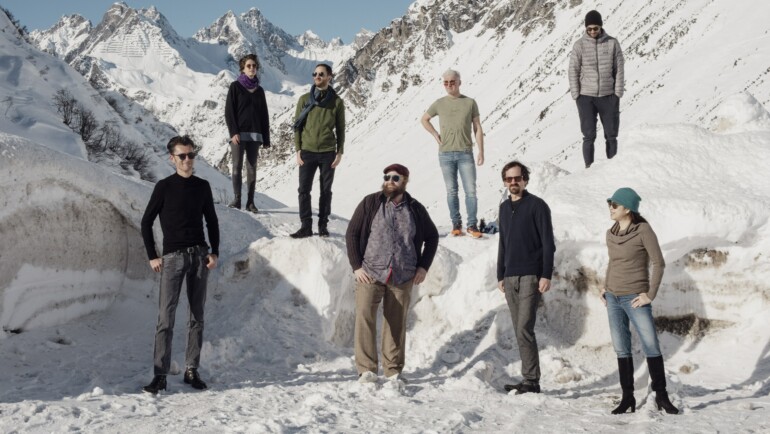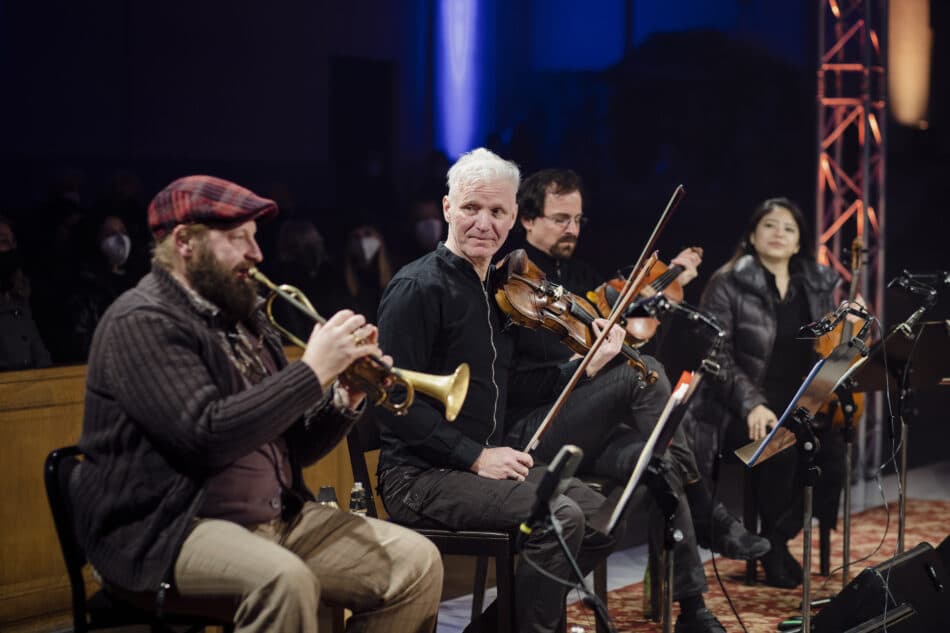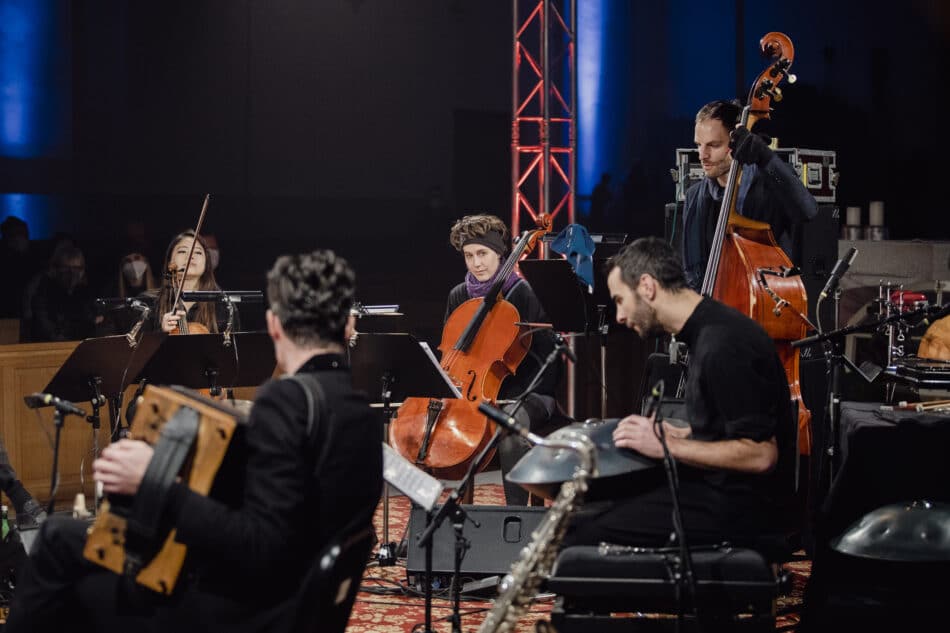
HERBERT PIXNER and THOMAS GANSCH let musical worlds collide in their joint project “ALPEN & GLÜHEN” (“Alps and Glow”). In collaboration with a hand-picked band including LUKAS KRANZELBINDER, MANU DELAGO and RADIO.STRING.QUARTET with BERNIE MALLINGER, IGMAR JENNER, CYNTHIA LIAO and SOPHIE ABRAHAM, they give Alpine folk music a live-cell therapy by crossing it with improvisation. In a highly diverse and playful way, they translate it into a modern sound with inherent sophistication, elegance and beauty. In an interview with Michael Ternai, the two talk about their longtime desire for a joint project, the criteria they apply to selecting musicians for the band, and their open-minded musical approach.
First of all, how do two “big players” like you come up with the idea to work together?
Thomas Gansch: Herbert and I have known each other for a long time. Our paths crossed many years ago when I played with Mnozil Brass on the street in Kitzbühel. He saw us there, and decided to bring Mnozil Brass to South Tyrol. So he was the first person to host us there. That was in 1998, and we remained closely connected in the following years. We also used to watch each other from the corner of our eyes, and to follow what the other was doing. So the desire to do something in collaboration is already very old.
Herbert Pixner: We all have our heroes. For me, Thomas Gansch and Mnozil Brass were just that. I admired them especially for their coolness and their courage to step on stage with their instruments and nothing else and just play away. Back in the 1990s, that was a real breakthrough. At that time every little band toured with two semi-trailer trucks. But then Mnozil Brass came along and managed to entertain the biggest halls with their instruments and charisma alone. They put the music in the foreground at their concerts. At that time, I used to think to myself: If I ever have my own band, I want to do it just like Mnozil Brass. In that way, it was always a big desire of mine to do something in collaboration with Thomas. Of course, it also had to do with the pandemic that things actually worked out last year. It happened that we had to endure many months without concerts, and this was the initial impulse for really getting down to brass tacks.
Thomas Gansch: Last year we had to cancel a concert with the project. It could not take place because the pandemic came back in its usual form. Everything was shut down again in winter. We thought, ‘since we have time now anyway, let’s meet.’ And that’s what we did. We went to Innsbruck and holed up in Treibhaus for three days to work on the programme. That’s where all this was created. Without the pandemic, it wouldn’t have been possible due to time constraints. And without this extra time, the album would certainly not have turned out so great.
In any case, judging from the names, you really got together a top line-up for the project! Manu Delago, Lukas Kranzelbinder and the radio.string.quartet with Bernie Mallinger, Igmar Jenner, Cynthia Liao and Sophie Abraham. Why did you choose these musicians in particular?
Thomas Gansch: Herbert and I simply looked for people with whom we would like to play. In some cases we didn’t even know them personally. I have always watched Lukas Kranzelbinder from afar. At some point we ran into each other in Vienna and I told him that we should do something together one day, and that I would get in touch – which is what I did. I knew Manu Delago, if at all,only by hearsay. I only knew that he was great. Herbert brought him on board. With radio.string.quartet, it was the case that I had a long friendship with Bernie Mallinger. He was my last male flatmate. In addition, I have already played quite a bit with the quartet. From that point of view, it was a logical consequence.
I was most amazed by this collaboration. There was no conflict at all with the people. There is no such thing as a diva among us and we really treat each other very respectfully and frankly at the same time. Everyone can speak up if he or she doesn’t like something.

This means that the personal aspects were very important in the selection process.
Herbert Pixner: Of course we could have invited big well-known stars. But that was never an issue. In the music scene, people know each other. They know exactly with whom it works well musically, and also with whom they like to get together in private and have a beer after the concert. We didn’t really want people who need to show off on stage, and who, in the worst case, are immediately offended if they get one solo less than someone else.
I believe that Thomas and I think quite similarly in this regard. There are musicians who are really brilliant technicians. We, however, were looking for musicians who, in a certain way, have two faces: who on the one hand have the spirit for something beautiful and on the other hand are able to whoop it up on stage. In any case, this was important to me, personally.
“[…] it is really amazing what quality we managed to come up with in a very short time”
The programme was created at Treibhaus. The record was made at Herbert Pixner’s gnadenlosSTUDIO. Did you already have some material there or did you start writing from scratch?
Thomas Gansch: We handed out the order that everybody had to bring something. So everyone could also rely a bit on the others. For example, I actually composed only two pieces for the line-up – a larger and a smaller one. With one of them I was almost sure that it would work with this instrumentation. At least that’s what I hoped. When we played the piece for the first time, it was confirmed to everyone’s relief that it really works with Herbert, me and the band.
What makes this band so unique is that all of the members are bandleaders themselves. They always approach the project with the attitude of getting the best out of it. There is no one to whom you lay down a sheet of music and he or she just plays it. Everybody is always looking for the best possible result. It’s an incredibly respectful way of dealing with each other. And it is really amazing what quality we managed to come up with in a very short time. I am still surprised at how natural everything felt during the rehearsals. Everything actually fell into place by itself.
All the participants are represented on the record with their pieces. How was it to deal with the compositions of the others?
Thomas Gansch: Manu’s piece was the most difficult one we rehearsed. In this piece you have to play very precisely.
Herbert Pixner: Manu wrote this piece intentionally in a metronomic style. In contrast to the other pieces, which are more atmospheric and flowing, this one needs this very tight beat.
Thomas Gansch: It has to run like clockwork, otherwise it won’t work. With the other pieces, on the other hand, we had to establish the groove first, and then we could play freely over it.
How is it possible for eight individualists to merge so easily?
Herbert Pixner: Of course it is an advantage that everyone has a lot of experience. All of us know how things work on stage. There are only band leaders. Everybody has been through everything. It’s simply all about making music together. That’s a starting point you don’t get every day. When you start a band at a young age, you first have to know what sound you want to create and into which style you want to move. That doesn’t matter for us, because we aren’t looking for a style. What comes out, comes out. It should just groove or sound weird. [laughs]
Thomas Gansch: Or in the best case, it should groove and sound weird at the same time. [laughs]
Herbert Pixner: I think that we are not even close to using the full potential of this group. Much more is still possible. And that reassures me for the future. We haven’t explored everything yet. There is no reason for us to sit back and be satisfied. Everyone is very keen to keep trying out something new, to find new timbres and grooves …

It’s about always continuing to evolve.
Thomas Gansch: The question that concerns me the most is where do we go from here? On the record there is actually only one piece that was really composed for this band. All the others were created earlier. Lukas’ piece has been performed with Shake Stew, Herbert’s piece has also been played before, Igmar actually wrote his piece for another project and then used it here because it fits in well. It’s exciting to see what will be added with all the experience from the tour we’re doing now. What new pieces will the musicians bring in now? Or what will be introduced on this tour, because we know that we can’t play a whole concert with the repertoire from the record. There will also be new things to be heard.
Herbert Pixner: That was also the case in Dornbirn, where we played recently. I had a new piece, and I suggested to try it out during sound check without a lead sheet or score, and then to improvise on stage in the evening. It worked out wonderfully. But you can only do that if you have a band you can fully rely on.
What I understand now is that this project is not a one-time event, but is definitely intended to be a long-lasting one.
Herbert Pixner: We hope that it will be a long-term project. There is already a timeslot scheduled for next year, which we are all keeping free, in order to dedicate ourselves to this project for about 2 weeks a year. Scheduling is not so easy. Everyone has at least two or three other projects going on. We dedicate this time to collaboration, and during this time we work only on this project, so it gains a certain exclusiveness. For example, we play it only in May and then not again until the following year.
Thomas Gansch: This is a very exclusive project. And it should stay like this to a certain extent. I foresee, already now, that there will be a premiere tour and also a farewell tour. Whether the farewell tour will be the next one or in twenty years, nobody knows. But I believe there will always be a place for this project. It just needs to get into the groove somehow. And we have time, we don’t need toput ourselves under pressure.
Thank you very much for the conversation!
Michael Ternai
Translated from the German original by Elisabeth Flunger.
